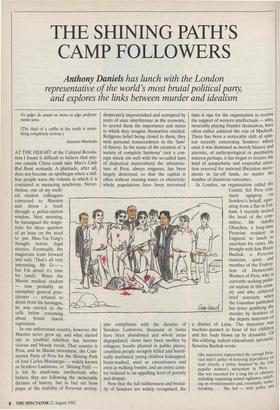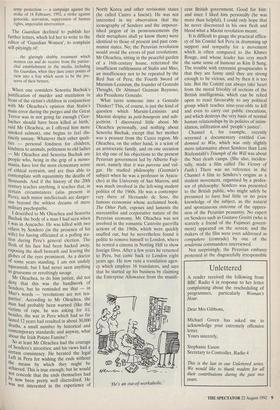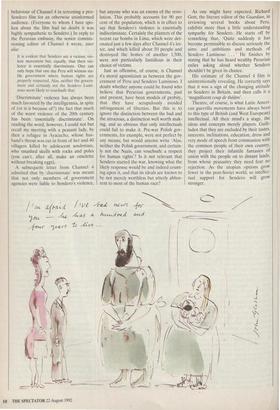THE SHINING PATH'S CAMP FOLLOWERS
Anthony Daniels has lunch with the London representative of the world's most brutal political party, and explores the links between murder and idealism
Un ripe de atazid en tietra es algo perfecta- mente serio.
(The thud of a coffin in the earth is some- thing completely serious.) Antonio Machado AT THE HEIGHT of the Cultural Revolu- tion I found it difficult to believe that any- one outside China could take Mao's Little Red Book seriously. A platitude, after all, does not become an apothegm when a mil- lion people wave the volume in which it is contained in menacing synchrony. Never- theless, one of my medi- cal student colleagues about brutal fascist repression. converted to Maoism and threw a brick through a police-station window. Next morning, he harangued the magis- trate for three quarters of an hour on the need to put Mao-Tse-Tung's thought before legal niceties. Eventually, the magistrate leant forward and said, 'That's all very interesting, Mr D—, but I'm afraid it's time for lunch.' When the Maoist medical student — now probably an exemplary general prac- titioner — refused to desist from his harangue, he was carried to the cells below screaming In one unfortunate country, however, the Maoists never grew up, and what started out as youthful rebellion has become vicious and bloody revolt. That country is Peru, and its Maoist movement, the Com- munist Party of Peru for the Shining Path of Jose Carlos Mariategui — widely known as Sendero Luminoso, or 'Shining Path' is led by small-time intellectuals who believe they are following the ineluctable dictates of history, but in fact act from pique at the inability of Peruvian society, desperately impoverished and corrupted by years of state interference in the economy, to accord them the importance and status to which they imagine themselves entitled. Religious belief being closed to them, they seek personal transcendence in the 'laws' of history. In the name of the creation of 'a society of complete harmony' (not a con- cept which sits well with the so-called laws of dialectical materialism) the infrastruc- ture of Peru, always exiguous, has been largely destroyed, so that the capital is often without running water or electricity; whole populations have been terrorised into compliance with the dictates of Sendero Luminoso; thousand of farms have been abandoned and whole areas depopulated; slums have been swollen by refugees; bombs planted in public places; countless people savagely killed and horrif- ically mutilated; young children kidnapped, brain-washed, used as executioners and even as walking bombs; and an entire coun- try reduced to an appalling level of poverty and despair.
Now that the full ruthlessness and brutal- ity of Sendero are widely recognised, the
time is ripe for the organisation to receive the support of western intellectuals — who, invariably playing Hamlet themselves, have often rather admired the role of Macbeth. There has been a noticeable shift of opin- ion recently concerning Sendero: where once it was dismissed as merely bizarre and atavistic, of anthropological or psychiatric interest perhaps, it has begun to receive the kind of sympathetic and respectful atten- tion reserved for national liberation move- ments in far-off lands, no matter the number of disastrous outcomes.
In London, an
organisation called the Comite Sol Peru con- ducts agitprop on Sendero's behalf, oper- ating from a flat in Ful- ham. I recently invited the head of the com- mittee, Mr Adolfo Oleachea, a long-time Peruvian resident in England, to lunch to ascertain his views. He brought with him Rocio musician, artist a and
ia d
member of the Federa- tion of Democratic Women of Peru, who is currently seeking politi- cal asylum in this coun- try and who achieved brief notoriety when the Guardian published
her letter justifying the murder by Sendero of
the Tdheeputymamyoaryeosrsesswoasf a district of Lima machine-gunned in front of her children and her body blown up by dynamite. of this edifying, indeed educational, spectacle, Senorita Buchuk wrote: (the mayoress) represented the corrupt Peru- vian state's policy of fostering dependency on state charity, a policy despised by the true popular women's movement in Peru. • • She was executed for a long list of offences, including organising armed vigilantes, snitch- ing on revolutionaries and, eventually, strike- breaking. . .. She led — with police and
army protection — a campaign against the strike of 14 February, 1992, a strike against genocide, starvation, suppression of human rights, imperialist intervention . . .
The Guardian declined to publish her further letters, which led her to write to the editor of 'Guardian Women', to complain self-pityingly of: . . . the glaringly shabby treatment which women can and do receive from the patriar- chal establishment in the media, including the Guardian, when they dare enter points of view into a fray which seem to be the pre- serve of their betters.
When one considers Senorita Buchuk's justification of murder and mutilation in front of the victim's children in conjunction with Mr Oleachea's opinion that Stalin's main error during the purges and the Great Terror was in not going far enough (`Gor- bachev should have been killed at birth,' said Mr Oleachea, as I offered him more smoked salmon), one begins to feel dis- tinctly uneasy. Whatever their other quali- ties — personal fondness for children, kindness to animals, politeness to old ladies — Mr Oleachea and Senorita Buchuk are people who, being in the grip of a mono- mania, have lost the most elementary sense of ethical restraint, and are thus able to Contemplate with equanimity the deaths of thousands. And if the history of the 20th century teaches anything, it teaches that, in certain circumstances (alas present in Peru), such minor intellectuals are danger- ous beyond the wildest dreams of mere military psychopaths.
I described to Mr Oleachea and Senorita Buchuk the body of a man I had seen when I was in Ayacucho. He was killed with two others by Sendero (in the presence of his wife) for having officiated at a polling sta- tion during Peru's general election. The flesh of his face had been hacked away, exposing the skull beneath and leaving the globes of the eyes prominent. As a doctor of some years standing, I am not unduly squeamish; but I had never seen anything so gruesome or revoltingly savage.
Mr Oleachea, to do him justice, did not deny that this was the handiwork of Sendero, but he reminded me that — in words ords — 'revolutions are not tea- parties'. According to Mr Oleachea, the man had probably been warned (like the victims of rape, he was asking for it); besides, the war in Peru which had so far lasted 12 years had resulted in about 30,000 deaths, a small number by historical and Contemporary standards; and anyway, what about the Irish Potato Famine?
So at least Mr Oleachea had the courage of Sendero's atrocities; and his views had a certain consistency. He berated the legal Left in Peru for wishing the ends without the means by which they might be achieved. This is true enough; but he would by concede that the ends themselves had 'y now been pretty well discredited. He was not interested in the experience of
North Korea and other revisionist states (he called Castro a fascist). He was not interested in my observation that the iconography of Sendero and the impover- ished jargon of its pronouncements (by their metaphors shall ye know them) were identical to those of present and past com- munist states. No; the Peruvian revolution would avoid the errors of past revolutions. Mr Oleachea, sitting in the peaceful garden of a 16th-century house, reiterated the insufficient ruthlessness of Stalin and Mao, an insufficiency not to be repeated by the Red Sun of Peru, the Fourth Sword of Marxism-Leninism, the founder of Gonzalo Thought, Dr Abimael Guzman Reynoso, aka Presidente Gonzalo.
What turns someone into a Gonzalo Thinker? This, of course, is just the kind of question which Marxist-Leninists and Maoists despise as petit-bourgeois and sub- jectivist. I discovered little about Mr Oleachea personally, and nothing about Senorita Buchuk, except that her mother was a peasant from the Cuzco region. Mr Oleachea, on the other hand, is a scion of an aristocratic family, and on one occasion let slip one of his objections to the present Peruvian government led by Alberto Fuji- mori, namely that it was parvenu and vul- gar. He studied philosophy (Guzman's subject when he was a professor in Ayacu- cho) at the University of San Marcos, and was much involved in the left-wing student politics of the 1960s. He was a contempo- rary there of Hernando de Soto, the famous economist whose acclaimed book, The Other Path, exposes and laments the mercantilist and corporative nature of the Peruvian economy. Mr Oleachea was not involved in the romantic Castroite guerrilla actions of the 1960s, which were quickly snuffed out, but he nevertheless found it politic to remove himself to London, where he rented a cinema in Notting Hill to show foreign films. After a few years he returned to Peru, but came back to London eight years ago. He now runs a translation agen- cy which employs 16 translators, and says that he started up his business by claiming the Enterprise Allowance from the munifi- 'He's an out-of-workaholic.' cent British government. Good for him: and since I liked him personally (he was more than helpful), I could only hope that he never discovered in his own flesh and blood what a Maoist revolution meant.
It is difficult to gauge the practical effica- cy of his Comite Sol Peru in drumming up support and sympathy for a movement which is often compared to the Khmer Rouge, and whose leader has very much the same sense of humour as Kim Il Sung. The trouble with extremist groupuscules is that they are funny until they are strong enough to be vicious, and by then it is too late. But the Comite can always take heart from the moral frivolity of sections of the British intelligentsia, which can be relied upon to react favourably to any political group which teaches nine-year-olds to kill and even to carry out public executions, and which destroys the very basis of normal human relationships by its policies of intim- idation, infiltration and 'people's justice'.
Channel 4, for example, recently screened a documentary entitled Con- demned to Win, which was only slightly more informative about Sendero than Leni Riefenstahl's Triumph of the Will was about the Nazi death camps. (She also, inciden- tally, made a film called The Victory of Faith.) There was no reference in the Channel 4 film to Sendero's origins as a student movement, organised by a profes- sor of philosophy: Sendero was presented to the British public, who might safely be presumed to have had little or no prior knowledge of the subject, as the natural and spontaneous outcome of the oppres- sion of the Peruvian peasantry. No expert on Sendero such as Gustavo Goritti (who is scarcely a friend of the Fujimori govern- ment) appeared on the screen; and the makers of the film were even addressed as compariero (comrade) by one of the senderista commanders interviewed.
Not surprisingly, the Peruvian embassy protested at the disgracefully irresponsible
Unlettered
A reader received the following from BBC Radio 4 in response to her letter complaining about the rescheduling of programmes, particularly Woman's Hour.
Dear Mrs Gibbons, Michael Green has asked me to acknowledge your extremely offensive letter.
Yours sincerely, Stephanie Eason Secretary to Controller, Radio 4 This is the last in our Unlettered series. We would like to thank readers for all their contributions during the past two years. behaviour of Channel 4 in screening a pro- Sendero film for an otherwise uninformed audience. (Everyone to whom I have spo- ken about the film had no doubt it was highly sympathetic to Sendero.) In reply to the Peruvian embassy, the senior commis- sioning editor of Channel 4 wrote, inter alia:
It is evident that Sendero are a vicious, vio- lent movement but, equally, that their vio- lence is essentially discriminate. One can only hope that one day Peru will witness sta- ble government where human rights are properly respected. Alas, neither the govern- ment and certainly not the Sender() Lumi- noso seem likely to vouchsafe that.
'Discriminate' violence has always been much favoured by the intelligentsia, in spite of (or is it-because of?) the fact that much of the worst violence of the 20th century has been 'essentially discriminate'. On reading the word, however, I could not but recall my meeting with a peasant lady, by then a refugee in Ayacucho, whose hus- band's throat was cut in front of her and 40 villagers killed by adolescent senderistas, who smashed skulls with rocks and poles (you can't, after all, make an omelette without breaking eggs).
A subsequent letter from Channel 4 admitted that by 'discriminate' was meant that not only members of government agencies were liable to Sendero's violence, but anyone who was an enemy of the revo- lution. This probably accounts for 90 per cent of the population, which is in effect to say that Sendero's violence is essentially indiscriminate. Certainly the planters of the recent car bombs in Lima, which were det- onated just a few days after Channel 4's let- ter, and which killed about 50 people and destroyed the homes of another 1,500, were not particularly fastidious in their choice of victims.
Just as offensive, of course, is Channel 4's moral agnosticism as between the gov- ernment of Peru and Sendero Luminoso. I doubt whether anyone could be found who believe that Peruvian governments, past and present, have been models of probity, that they have scrupulously avoided infringement of liberties. But this is to ignore the distinction between the bad and the atrocious, a distinction well worth mak- ing, and so obvious that only intellectuals could fail to make it. Pre-war Polish gov- ernments, for example, were not perfect by any means; but would anyone write 'Alas, neither the Polish government, and certain- ly not the Nazis, can vouchsafe a respect for human rights'? Is it not relevant that Sendero started the war, knowing what the likely response would be and indeed count- ing upon it, and that its ideals are known to be not merely worthless but utterly abhor- rent to most of the human race?
As one might have expected, Richard Gott, the literary editor of the Guardian, in reviewing several books about Peru, exhibits more than a little understanding sympathy for Sendero. He starts off by remarking that, 'Quite suddenly it has become permissible to discuss seriously the aims and ambitions and methods of Sendero Luminoso . . . ' He finishes by stating that he has heard wealthy Peruvian exiles asking aloud whether Sendero shouldn't be given its chance.
His estimate of the Channel 4 film is unintentionally revealing. He correctly says that it was a sign of the changing attitude to Sendero in Britain, and then calls it a 'magnificent coup de theatre'. Theatre, of course, is what Latin Ameri- can guerrilla movements have always been to this type of British (and West European) intellectual. All their mind's a stage, the ideas and concepts merely players. Guilt- laden that they are excluded by their tastes, interests, inclinations, education, dress and very mode of speech from communion with the common people of their own country, they project their infantile fantasies of union with the people on to distant lands, from whose peasantry they need fear no rejection. As the utopian options grow fewer in the post-Soviet world, so intellec- tual support for Sendero will grow stronger.












































 Previous page
Previous page